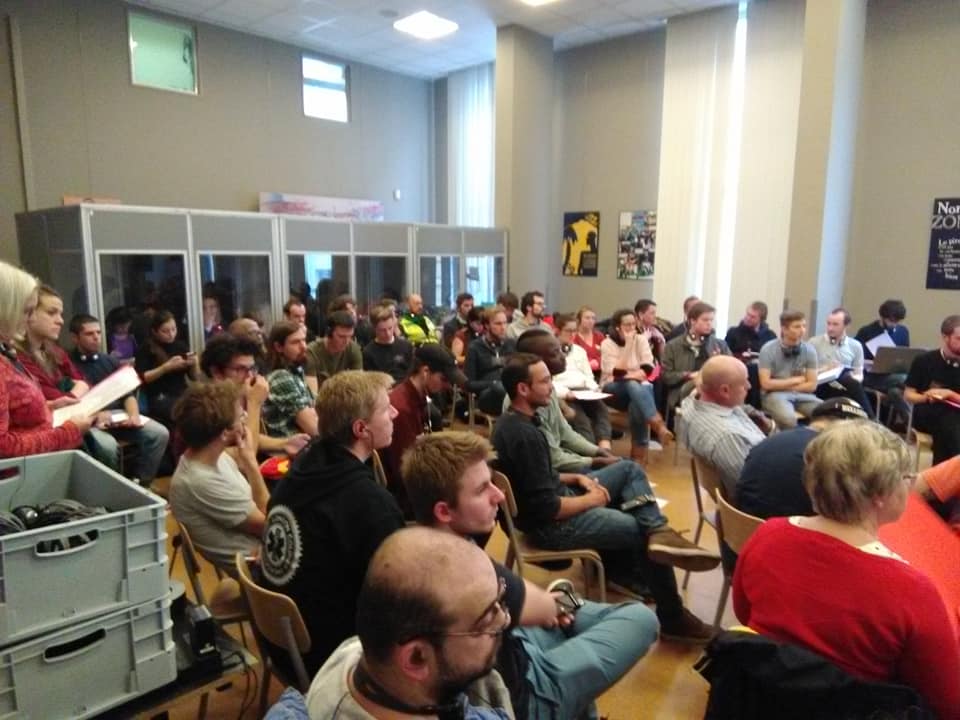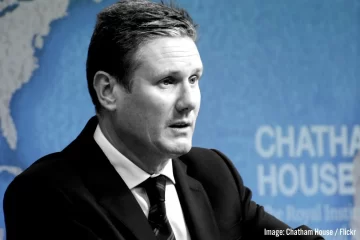On 25 and 26 October 2018, 100 meal couriers came together in Brussels. They are part of 34 courier collectives and/or trade unions that fight the exploitation by platforms such as Deliveroo, UberEats, Foodora and Glovo. They set up the Transnational Federation of Couriers to share their experiences and the fight against the multinationals.
Critical mass
The European conference was a product of the struggle of the Brussels Deliveroo couriers. Last winter they took action against the forced change in their legal status from employee to (fake) self-employed. They organised the first Belgian courier strikes and occupied the offices of Deliveroo-Benelux for 48 hours. The struggle came like a bolt out of the blue. Up until then, it was a frequently heard complaint that the atomization and precarious working conditions of the couriers means that we don’t have a collective consciousness and can’t be organised.
The experiences from 12 countries (Britain, France, Italy, Spain, Ireland, the Netherlands, Germany, Switzerland, Austria, Norway, Finland and Belgium) refuted such pessimism. As the couriers of the autonomous Parisian courier collective (CLAP) say: “the street is our factory.” And from that idea, they organise themselves to take the fight to the bosses.
When they first sign up, many couriers believe Deliveroo when the company says that the gig economy has eradicated the mutual antagonism between employee and employer. But thanks to the work of courier organisations, that belief is lasting for a shorter and shorter period of time. Once the atomization of the workers has been broken, couriers can form a conscious and critical mass.
New sector, old exploitation
During the first day of the meeting the various courier collectives and trade unions sketched the 19th Century working conditions into which couriers are pushed, and how they fight against it. The problems of organising couriers are a product of legal deregulation, which is what makes the platforms so rich.
Only in a handful of countries, such as Norway and Germany, are couriers are paid per hour. In other countries, payment is made per delivery. That means that we are under constant pressure. If we have to wait for a restaurant, which is increasingly common because most restaurants cannot keep up with so many orders, we are not paid.
The platforms organise the work so that all costs are shifted to the couriers. We buy our own equipment, from our bike to the platform-branded backpack with which the meals are to be delivered. We do not have employee status but are (fake) self-employed. It would be out of question for a courier to be ‘independent’ of a platform. We are completely subject to the employer who unilaterally imposes the conditions of employment. Several courts in Spain, California, and Britain recently ruled that the platforms should be regarded as employers and the couriers as employees, which is a major victory for the couriers.
Self-employment status also means that we have to keep track of our administration ourselves, and that we have to pay social contributions and taxes on our already meagre gross income. It also means that if we are ill or injured, we have no income. If our bike is stolen, our bosses say that they can “unfortunately do nothing about it”. If we lose a limb in an accident, Deliveroo’s cynical insurance policy will issue us just 50,000 euros.
We have all the disadvantages of being self-employed, and none of the advantages. And at the same time we have none of the protections that come with being an employee.
The stream of information and communication goes only in one direction, from bosses to workers, and shows a total lack of respect towards the couriers. Complaints or comments about the work can only be sent by email and are usually not answered or are dismissed. Deliveries are distributed among the couriers according to an algorithm that is kept obstinately hidden.
This summer, Deliveroo introduced a new payment system. The variables of the new calculations have not been fully disclosed. In the summer, the fees in Belgium per delivery were relatively good as a courier earned on average 15 euros per hour. From September onwards, however, they systematically declined to 12 euros per hour. Of course, we were left to discover that for ourselves, because Deliveroo does not report such changes to its workers. The couriers only notice it at the end of the month when the bills are due.
After the first strikes, the places where the couriers had to go to get new deliveries were removed. It was at these spots, where a large number of couriers gathered, that they had begun to talk and organise, which is why the bosses wanted to get rid of them. Every effort is being made to atomize couriers. Whoever is known to be a member of a courier organisation runs the risk of being fired or ‘taken offline’. The difficult working conditions lead to a high turnover: the average courier stays for only two months. It therefore requires a continuous effort to organise the couriers.
The new proletariat
The poor working conditions led to a series of demonstrations, strikes and occupations in Britain, France, Spain, Italy, the Netherlands, Belgium etc. The rapid emergence of such platforms has taken the profession of bike or motorcycle couriers out of the niche economy. In the past, individual restaurants engaged their own couriers. Today the couriers are concentrated within a few platforms and the number of deliveries has increased enormously. Since Deliveroo started in Belgium in September 2015, bike couriers have become a common phenomenon in eleven cities around the country. In Belgium alone, it is estimated that there are some 2000 couriers working at any one time. The profession is today carried out on an industrial scale and the couriers are proletarianised.
The words of Marx and Engels, from the Communist Manifesto, come to mind:
“The bourgeoisie cannot exist without constantly revolutionising the instruments of production, and thereby the relations of production, and with them the whole relations of society. (…) All that is solid melts into air, all that is holy is profaned, and man is at last compelled to face with sober senses his real conditions of life, and his relations with his kind.”
Capitalism never sits still. It constantly develops the working class, throwing new layers of the population and whole sectors into a proletarian existence.
This explains the collective consciousness that has developed among couriers, and the methods through which they can take action in defence of their working conditions and living standards. In 2016 the first strike took place in London. Since then, the number of strikes has grown so large that it’s impossible to keep track. Industrial action by couriers is most developed in Britain, where they are organized by small but militant unions: in London by the Industrial Workers of Great Britain and outside the capital by the Industrial Workers or the World – Couriers Network. The French couriers are also at the forefront of the struggle. The Parisian collective CLAP is the oldest collective, and it already organises several ‘generations’ of couriers.
Most of the conference participants were between 20 and 30 years old. However, this youthfulness did not at all effect the level of the discussions and interventions. These young people have already organised militant strikes, stood up to pressure from the platform bosses, and are determined to fight for their demands. There was also a total absence of complaining, despite the difficult circumstances in a sector in which collective organisation is not recognised.
The role of the State
In many countries, lawsuits against the sector bosses are underway. The purpose of these is to force the platforms to comply with existing labour legislation. After all, the profits of the platforms depend largely on their getting around these laws. In Belgium, as well as a lawsuit, there is an investigation underway by the Federal Office for Social Affairs. The problem is that these legal cases tend to kick things into the long grass and have a very uncertain outcome. The fact is that governments support the platforms, as demonstrated by the Belgian Law de Croo of 2016. The law legalises the activities of the platforms outside of the labour legislation. With this law’s new Peer2Peer status, you can now earn up to 6,100 euros a year without any further administration or regulation.
The entire capitalist class is in favour of the methods used by the platforms because it opens up the possibility of dismantling labour legislation in other sectors as well. An example of this is the eruption of the so-called ‘dark kitchens’. These kitchens are owned by the platforms themselves. In a small room in an empty building, or even under a bridge, an underpaid employee makes the same meals as those from the most popular restaurants. In Paris, a former warehouse has been transformed into an industrial kitchen run by Deliveroo. In Ghent there is a kitchen in someone’s home that only delivers for Deliveroo.
Collectives not a contradiction to trade-unionism
In the run-up to the meeting, at the urging of some of the couriers, it was decided to give all non-couriers and trade union secretaries the status of ‘observer’. This is surprising because the trade unionists who participated in the conference are committed to the couriers’ struggle. Their contributions (financial, organisational, etc.) made organising the conference possible. Numerous trade unionists have supported the couriers’ fight with advice and action, and remarked: “During the strike, we were not ‘observers’, were we?”
The introduction of the ‘observer’ status gave the conference a distorted character. This anti-union attitude is limited to a few collectives and individuals. All successful collectives are organised by a trade union (for example in Britain with the IWGB and the IWW, the couriers of Bordeaux have consciously joined the CGT , the Riders union of the FNV in the Netherlands, etc.) or work closely with trade unions (CLAP, the Belgian collective). This link with the trade unions is important. They are the largest organisations of the working class and enable solidarity between the various sectors. The couriers have a role to play in this: their struggle can give confidence to the other sectors. These other sectors that often have a better negotiating position can be won to support the struggle of the couriers. That is the way class solidarity works.
The organisational form of a collective, as opposed to a union, is popular because it is regarded as less distant, in a sector where trade unions are not (yet) recognised. It also allows the couriers to get together more effectively, regardless of the initial position of couriers towards the trade unions, or the distribution of the couriers under various trade unions. With these collectives, the organised couriers are the ones who take the decisions at the general meetings.
The few instances of tension between the couriers and the trade unions came when a trade union negotiated with the platforms outside of the wishes of the couriers. This was the case, for example, with the CGIL in Italy and led to a general distrust towards the trade unions. Trade unionists who rely on the initiative and the fighting skills of the couriers will never end up in such a situation.
Trotsky himself explained this: “the workers’ movement does not have a systematic and well-balanced, but a feverish and explosive character. Slogans as well as organisational forms should be subordinated to the indices of the movement. On guard against routine handling of a situation as against a plague, the leadership should respond sensitively to the initiative of the masses.” (The Transitional Program, 1938)
The Transnational Courier Federation established
The plenary session of the second day voted on several decisions. First, the Transnational Federation was established. A first international day of action was scheduled on 1 December (coincidentally also the birthday of the founder of Deliveroo, Will Shu). The demands of the couriers were agreed: a guaranteed minimum income per hour, transparency on data and the algorithm, recognition of collective rights, respectful communication towards the couriers, etc. No priorities in the demands have yet been decided. The coming struggles will give the necessary direction. The next Congress of the Federation will be held in Paris and will have to tackle that question.A new layer of the working class is organising to combat capitalist exploitation. Let the platforms be warned.
By Jan Michels
Member of the Belgian Couriers Collective and member of BTB (the Belgian Transport Association, the socialist trade union in the transport sector)





0 Comments